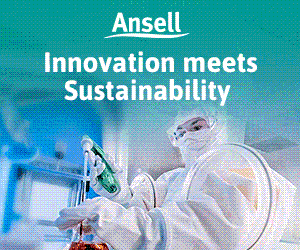Publication of antibacterial curtain study underway
The PurThread Technologies-funded study looks at hospital curtains that resist bacteria
Past research, conducted at the University of Iowa Carver College of Medicine, found that 92% of hospital privacy curtains were contaminated with potentially dangerous bacteria such as methicillin-resistant Staphylococcus aureus (MRSA) and vancomycin-resistant enterococcus (VRE) within one week of being laundered.
The same research group recently submitted for publication a follow-on randomised, controlled study, examining the effectiveness of PurThread privacy curtains in a clinical setting. The study is currently on press, and publication is expected later in 2012 in the American Journal for Infection Control. Both studies are funded through non-restrictive research grants from PurThread Technologies.
The latest study, titled, “Hospital Privacy Curtains are Frequently and Rapidly Contaminated with Potentially Pathogenic Bacteria,” monitored 43 privacy curtains over a three-week period in a medical ward, surgical intensive care unit (ICU) and a medical ICU.
Healthcare workers will frequently touch privacy curtains and then go on to touch patients. The curtains are difficult to clean and disinfect and in most hospitals are infrequently changed, often only after dirt is visible.
“It’s estimated that US hospitals see more than 1.7 million HAIs each year at a cost of $16,000 to $19,000 per patient, or up to $45 billion a year,” said Bill O’Neill, VP of Infection Control Applications at PurThread Technologies, an antimicrobial technology company focused on textile products for use in infection prevention.
“While many of these HAIs are a result of catheters and ventilators, this study from the University of Iowa contributes to mounting evidence showing that surfaces in hospitals may be a source of contamination for healthcare worker hands after hand hygiene.”
Studies show 20-40% of HAIs can be traced to the contamination of healthcare workers' hands. The immediate action healthcare workers can take today is to wash their hands after touching privacy curtains and before touching the patient.
The company believes a developing market for antimicrobial products, for both soft and hard surfaces, holds the potential to help hospitals continuously reduce the bioburden on frequently touched surfaces.
The PurThread technology integrates a proprietary alloy of established antimicrobial elements, such as silver and copper, into the polyester fibers themselves. PurThread’s method provides an even distribution of antimicrobial elements that cannot wear off or wash out.
“This is an exciting time for hospital infection prevention,” added O’Neill. “Research data and technology improvements are giving hospitals many new options. We look forward to helping hospitals in their fight to reduce HAIs and pioneering a new standard for soft surface cleanliness.”




